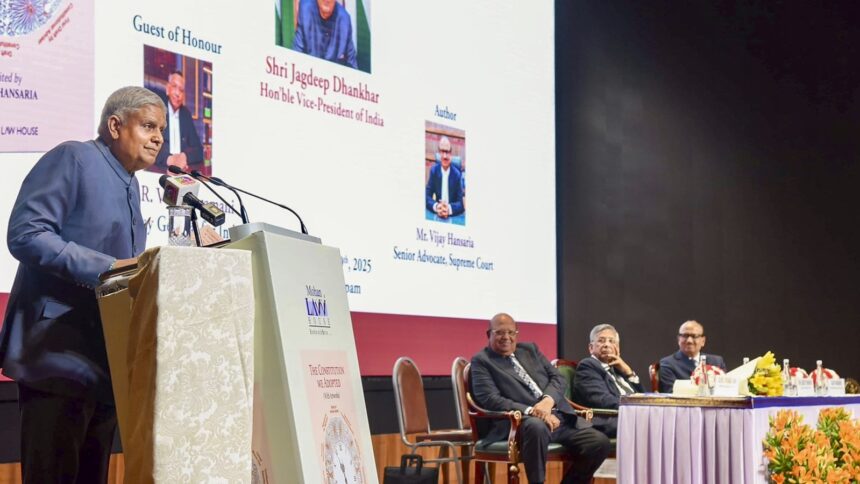QUESTIONING THE in-house probe by a panel of three judges into allegations of discovery of during a fire incident in March this year, Vice-President Jagdeep Dhankhar Monday said it “does not have any constitutional premise or legal sanctity but most importantly it will be inconsequential”, and wondered why no FIR has been registered in the matter yet.
Stressing on the need for an FIR, Dhankhar said, “People are waiting with bated breath… The money trail, its source, its purpose, did it pollute the judicial system? Who are the bigger sharks? We need to find out.”
“Already two months have gone by… investigation is required to be (done expeditiously). So is the case with the registration of an FIR,” he said while speaking at the launch of a book, The Constitution We Adopted, edited by senior advocate Vijay Hansaria.
Stating that the incident “is agitating mind of billions”, Dhankhar said there is a need for “scientific, forensic, expert, thorough investigation that reveals everything and leaves nothing unrevealed. The truth needs to be laid bare”.
Dhankhar also called for revisiting the 1991 K Veeraswami judgment, which laid down that prior sanction is needed for prosecuting judges, saying it had “erected scaffolding of impunity” around the judiciary.
On March 22, the then Chief Justice of India Sanjiv Khanna had set up a three-member in-house committee to inquiry into the allegations around Justice Varma. The committee in its report is learnt to have found the allegations credible.
Justice Varma, who was transferred to Allahabad High Court from High Court days after the charges surfaced, has denied the allegations.
In his address, Dhankhar said, “…we cannot get away from the ground reality today. We celebrate the book release, but we are confronted with the jarring reality. Our judge’s residence in Lutyens Delhi had burnt notes, cash haul, there is no FIR till date.”
He said in a country governed by rule of law, “there can be no occasion whatsoever to delay even for a moment… because that is ordainment of law. The rule of law is the very foundation of society”.
“Democracy has to be defined primarily by three aspects — expression, dialogue and accountability. If expression is throttled, democracy is weakened. But if one enjoying expression believes I alone am right and does not want to listen to the other point of view, then democracy gets fragile because that is arrogance personified. The other point of view has to be understood and similarly, accountability,” Dhankhar said.
“The surest way to degenerate an individual or bring down an institution is to keep it away from probe, keep it away from scrutiny. Which means the institution becomes, the individual becomes rule unto oneself. And therefore, if we have to really nurture democracy…it is inescapable that we hold every institution accountable and every individual accountable and in accordance with law.”
Indicating that his words were well-intended, Dhankhar said, “I will not do anything which in the remotest form will compromise the dignity of the judiciary.”
Pointing out that two of the judges in the inquiry panel were Chief Justices, he said, “They involved with an inquiry which does not have any constitutional premise or legal sanctity but most importantly it will be inconsequential. The inquiry report may be sent to anyone under the mechanism evolved by the court on the administrative side.”
“Can in this country we afford to invest so much time at the cost of administrative work of the Chief Justice of a High Court, judicial work of the High Court?”
Dhankhar said the Supreme Court did what it could, given the existing mechanism, which “evolved by a judgment in early 90s”, and called for revisiting the process “because the scenario is indeed one for which every person in the country is waiting”.
“They want nothing but the full truth to come out. They cannot wait any longer, because this concerns the judicial institution,” he said. “I am full of optimism and hope that your legacy issues that deters from responding to the sublimity of accountability and transparency will be overcome by revisitation.”
Pointing out that he raises issues concerning the judiciary “because a robust independent judicial system is the safest guarantee for the citizen and also for survival of democracy”, Dhankhar said “the judicial landscape is changing for the better.”
Praising former CJI Khanna, he said: “Partly, the confidence (in the judiciary) has been restored by (former) CJI Khanna when they put on public domain, documentation which people thought will never be shown to them. That was a big step by him to project accountability and transparency. If democratic values have to prosper, I’m sure this is a test case. There must be investigation by those concerned with investigation.”
Dhankhar said he “focused on” the Justice Varma case “because this incident is a concrete manifestation of what ails the system at the moment”.
“The entire nation was worried. An incident took place on the night in March. A nation of 1.4 billion did not come to know about it till after a week. Just imagine how many such other incidents may have taken place of which we are not in the know of!”
The Vice-President also agreed with concerns expressed by CJI B R Gavai about the protocol violations during the latter’s visit to Maharashtra on Sunday.
“This morning I was reminded of something which is very critical in the country. And that is not for oneself, what the present Chief Justice said. We must believe in protocol. The Chief Justice of the country and protocol is placed very high. When he indicated this, it was not personal. It was for the position he holds. And I’m sure this will be kept in mind by one and all…”
He reported from the Delhi High Court and the Supreme Court of India during his first stint with The Indian Express in 2005-2006. Currently, in his second stint with The Indian Express, he reports from the Supreme Court and writes on topics related to law and the administration of justice. Legal reporting is his forte though he has extensive experience in political and community reporting too, having spent a decade as Kerala state correspondent, The Times of India and The Telegraph. He is a stickler for facts and has several impactful stories to his credit.







